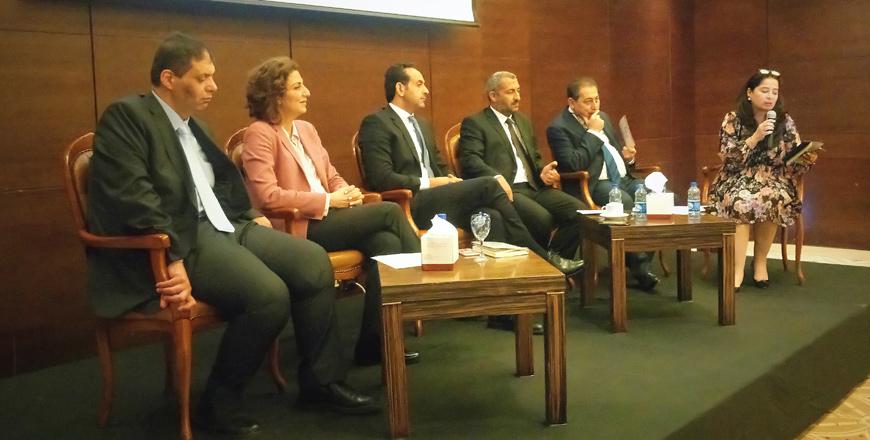You are here
‘Gov’t needs to work with society to address legal deficiencies in human rights field’
By Ana V. Ibáñez Prieto - Mar 26,2018 - Last updated at Mar 26,2018

Speakers take part in the Second National Consultative Forum on Jordan’s Universal Periodic Review of Human Rights on Monday (Photo by Ana V. Ibáñez Prieto)
AMMAN — Government Coordinator for Human Rights Basil Tarawneh on Monday said that the Kingdom is concluding its activities towards the presentation of the Universal Periodic Review (UPR) of Human Rights 2018, stressing that “it is the government’s responsibility to address the deficiencies still present in our legislation and commit to a participatory approach based on dialogue under the directions of His Majesty King Abdullah”.
The remarks came during the Second National Consultative Forum on Jordan’s Universal Periodic Review of Human Rights 2018, organised by the Eye Jordan Coalition in cooperation with the Government Coordinator for Human Rights.
During the opening of the forum, Tarawneh praised “the work of all national institutions, alliances and civil society organisations (CSOs),” thanking them for “the input and recommendations provided to decision makers, which the government looks forward to putting in practice”.
The meeting saw the participation of dozens of members of the human rights community in Jordan, including representatives of the Insan Coalition, the JOCAT Coalition, the Iradet Shabab Coalition and the National Centre for Human Rights (NHRC).
In a speech on behalf of the CSOs present at the forum, director of the Al Quds Centre for Political Studies Oraib Rantawi said: “This encounter proves that the Jordanian civil society is a key player in our public life with its effective presence,” adding that the forum “shows the willingness of the government to cooperate and interact with the citizens”.
“However, this should not conceal the challenges that we are still facing,” Rantawi continued, stressing the need to institutionalise the relationship between the civil society and the government to “end with the constraints that still prevent organisations from carrying on with their role”.
In the same vein, NHRC Commisioner General Musa Brizat stressed: “If Jordan can present a good image of itself to the Human Rights Council [HRC] in Geneva, we will be able to say that we have succeeded.”
“However, building a real partnership should consist in something more than posing a nice picture, and we shall keep on working together to achieve our own goals as a country,” he continued.
UN Resident and Humanitarian Coordinator in Jordan Andres Pedersen commended all participants for “coming together for this UPR process,” stressing “the invaluable role that civil society plays in making human rights a full reality”.
For his part, Minister of Political and Parliamentary Affairs Musa Maaytah noted that “this encounter is not just for the sake of Geneva. We are here today because we care about human rights, and the satisfaction of Jordanian people at all levels”.
“The essence of our progress is in dialogue, and it is for the sake of dialogue that we are here today,” Maaytah continued, stressing the “real political will of the Jordanian leadership and the importance of reaching agreements on the issues we need to work on”.
Jordan’s 2018 UPR is set to be presented in Geneva later this year, providing an overview of the actions that the Kingdom has taken to improve its human rights situation and fulfill its obligations to the HRC.
Related Articles
DEAD SEA – Local and international human rights activists and experts met on Wednesday to discuss the preparations of Jordan's Universal Per
AMMAN — A political will at the highest levels works hard in Jordan to activate cooperation between all public civil society organisations t
AMMAN — Prime Minister Omar Razzaz on Monday stressed the importance of heeding the recommendations of the Human Rights Council (HRC) in Gen















